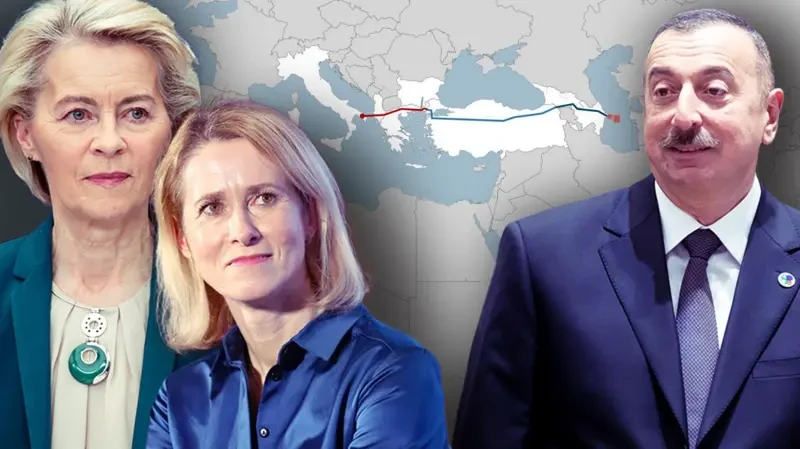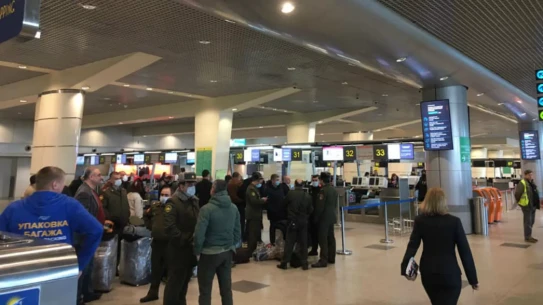After the start of the war in Ukraine in 2022, the leaders of the European Union have applied to Azerbaijan as partner energy to reduce dependence on Russian gas. Critics say that the result was large-scale pressures in Azerbaijan, and the EU has betrayed its principles, unable to solve the problem of lack of gas. The BBC spoke with diplomats and experts to assess the impact of the closeness of the authoritarian Republic with the Democratic Alliance.
Until 2022, about 45% of Europe imports to Russia.
Ukraine's invasion of the EU has forced the EU to realize the critical vulnerability in this issue, and in two years the Russian department decreased by less than 19%.
In this process, the main role played the redirection of natural liquid gas supplies by sea, not pipelines, which allowed us to buy more from countries such as the United States, Qatar and Egypt.
However, Azerbaijan also played its role, increasing supplies from 8.2 billion cubic meters of 2021 to almost 13 billion cubic meters in 2024.
The share of gas imports of Azerbaijan on the EU remains modest, 4.3%.
However, the situation is different in the South Gas Corridor in union connected to Azerbaijan.
Bulgaria receives about 40% of its gas through it, and Greece and Italy are more than 15%.
It cannot be said that the EU depends on Baku. On the contrary, the Brussels strategy has avoided such dependence, diversifying supplies.
"Light in Europe will not marry the shortage of Azerbaijani gas," said Ben Godwin, an economic analyst at Prism.
However, the problem is that the EU does not have negotiation levers in Baku, the high-ranking European diplomat told the BBC.
"At the moment, Azerbaijan is in a very comfortable position in terms of external pressure," he said. "I do not see Europe as one force that can say to Azerbaijan that we will no longer buy your gas. Because the Italians, the Greeks, the Balkan countries, will still say. "No, we can't, we need Azerbaijani gas. In this situation, Europe has no significant leverage on Azerbaijan. "
Energy partnership "does not change our position on human rights in Azerbaijan," the EU official told the BBC.
There are several reasons for the current Russian aggravation, the main one, according to political scientists, has gained Baku's experience in relations with Moscow. But it is also a signal to the West.
"Azerbaijan is promoting its image as Putin's opponent," said Kirill Krivosheev, Caucasian expert.
Kirill Krivosheev was compared to Ali with Nikolae Chausheskin, a cruel Romanian dictator, who, despite being an ally of Moscow, condemned the Soviet invasion of Prague in 1968.
"And for this simple gesture he received good support in the West, that is, it was not a" shameful "to cooperate with him," Krivosheev said. "And the same thing happens to Aliyev today, when everything is forgiven for the support of Ukraine."
Moscow, in turn, forgives Baku, including the Western branch of the North-South transport corridor, which runs between Russia, India and the Persian Gulf, which is especially important in the context of the decline in trade with Europe. Last year, the transit to the corridor increased by 28%.
"Aliyev is an experienced player who plays very skillfully on the West and Russia's geopolitical beech," said Eldar Mammadov. He noted that in his relations with the EU, the leader of Azerbaijan acts as an assistant to reduce dependence on Russia, and in relations with the Kremlin, as a partner in overcoming the isolation under sanctions.
This year, Moscow and Baku agreed to expand the North-South corridor.
The so-called average corridor (officially, the Trans-Caspian transport route) passes through Azerbaijan, which moves from China to Europe, bypassing Iran and Russia under sanctions.
After the start of war in Ukraine, the volume of cargo through it has increased more than five times.
"The European Union has a strategic goal, to develop the middle corridor, and it is impossible to do without Azerbaijan," Kirill Krivosheev said.
Azerbaijan is unpopularly used its position, according to which the high-ranking European diplomat has talked to the BBC.
"Azerbaijan and the Caspian Sea are needed for the Russians for the influence of the North-South transit in the South Caucasus. "Azerbaijan is necessary for energy supply, as well as the East-West transit," he said, adding: "The approach of the Azerbaijani leadership is characterized by short-term, instant thinking. They think that they can treat everyone aggressively and go unpunished. "


